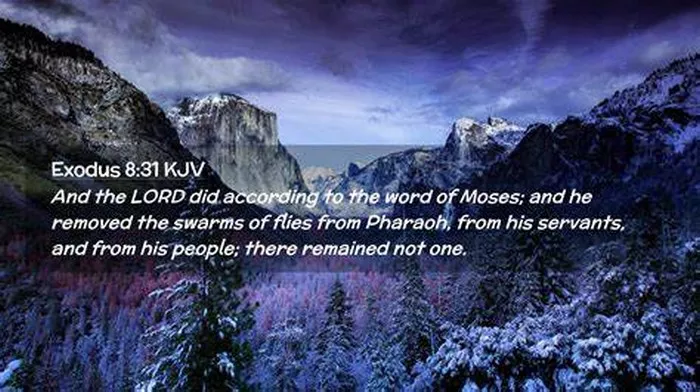Read the Daily Bible Verse – Exodus 8:31 To Strengthen Your Spiritual Journey.
Exodus 8:31 marks a significant moment in the narrative of the plagues that God sent upon Egypt. It demonstrates both God’s mercy in response to Moses’ intercession and the persistent defiance of Pharaoh. In the King James Version (KJV), Exodus 8:31 reads:
“And the Lord did according to the word of Moses; and he removed the swarms of flies from Pharaoh, from his servants, and from his people; there remained not one.”
This verse reveals God’s responsiveness to prayer, His power over creation, and His desire to extend mercy despite Pharaoh’s obstinacy. It also sets the stage for Pharaoh’s continued rebellion, offering insights into human nature and divine patience.
The Context on Exodus 8:31 KJV
The Fourth Plague
The fourth plague, as described in Exodus 8:20-32, involved swarms of flies descending upon Egypt. These flies caused great distress, sparing only the land of Goshen where the Israelites lived. This distinction underscored God’s protection of His people and His sovereignty over all creation.
Pharaoh, overwhelmed by the devastation, summoned Moses and Aaron, promising to let the Israelites go to sacrifice to God in the wilderness. However, his promise was contingent, and his track record suggested deceit. Moses agreed to intercede with God to remove the flies, warning Pharaoh not to renege on his word (Exodus 8:29).
Immediate Context
Exodus 8:31 follows Moses’ prayer to God for relief from the plague. The verse confirms that God responded to Moses’ plea by completely removing the flies from Egypt. This divine intervention highlights both the effectiveness of Moses’ intercession and God’s willingness to show mercy, even to an unrepentant Pharaoh.
The Meaning of Exodus 8:31
God’s Power and Sovereignty
The removal of the flies demonstrates God’s control over creation. Just as He sent the plague, He was able to remove it entirely, showing His absolute authority. The phrase “there remained not one” underscores the completeness of God’s action.
The Efficacy of Intercession
Moses’ intercession highlights the power of prayer in invoking God’s mercy. God’s willingness to act “according to the word of Moses” showcases the close relationship between Moses and God and underscores the role of a mediator.
A Test of Pharaoh’s Heart
While God’s mercy was evident in removing the flies, this act also tested Pharaoh’s sincerity. Despite the miraculous deliverance, Pharaoh’s heart remained hardened, setting the stage for further plagues and revealing his refusal to submit to God.
Exodus 8:31 Application in Life
Trusting in God’s Power
Believers can find reassurance in God’s ability to act decisively and completely in response to prayer. The removal of the flies serves as a reminder that nothing is beyond God’s control, whether in nature or in life’s challenges.
The Role of Intercessory Prayer
Moses’ example encourages Christians to pray for others, including those who are resistant to God’s will. Intercessory prayer is a powerful tool for seeking God’s intervention and demonstrating love for others.
Recognizing God’s Mercy
God’s willingness to remove the flies despite Pharaoh’s deceit reflects His character as a merciful and patient God. Believers are reminded to emulate this mercy in their relationships with others, extending grace even when it is undeserved.
Comparison with Other Biblical Texts
Old Testament Parallels
Genesis 18:23-33: Abraham’s intercession for Sodom parallels Moses’ intercession for Pharaoh, showcasing the power of a righteous person’s prayers.
2 Chronicles 7:14: God promises to hear the prayers of His people and heal their land, emphasizing His responsiveness to sincere intercession.
New Testament Insights
Matthew 7:7-8: Jesus teaches about the power of persistent prayer, affirming that those who ask, seek, and knock will receive. Moses’ intercession exemplifies this principle.
James 5:16: “The effectual fervent prayer of a righteous man availeth much,” aligns with Moses’ role as an intercessor.
Themes of Mercy and Judgment
Psalm 103:8-10: God is described as merciful and slow to anger, a theme reflected in His willingness to remove the flies despite Pharaoh’s defiance.
Romans 2:4-5: Paul warns against taking God’s kindness for granted, a lesson mirrored in Pharaoh’s continued rebellion.
Modern-Day Relevance
The Power of Prayer
Exodus 8:31 reminds believers of the power of prayer to bring about real change. In today’s world, where challenges can seem overwhelming, this verse encourages Christians to turn to God in prayer, trusting in His ability to intervene.
Responding to God’s Mercy
Pharaoh’s hardened heart serves as a warning against taking God’s mercy lightly. Modern believers are called to respond to God’s grace with gratitude and obedience, rather than indifference or rebellion.
Living as Intercessors
Just as Moses interceded for Pharaoh and Egypt, Christians are called to pray for their communities, leaders, and even those who oppose them. This act of intercession reflects God’s love and can lead to transformation in the lives of others.
Conclusion
Exodus 8:31 is a profound verse that showcases God’s mercy, power, and responsiveness to prayer. It challenges believers to trust in God’s sovereignty, engage in intercessory prayer, and respond to His grace with obedience and gratitude.
As we reflect on this verse, may we be inspired to live as faithful intercessors, extending God’s mercy to others and trusting in His ability to bring about change. By learning from Moses’ example and Pharaoh’s failures, we can grow in our faith and deepen our relationship with God, living as witnesses to His truth and love.
Exodus 8:31 Commentary
Jewish Perspectives
Jewish commentators often emphasize God’s power and faithfulness in responding to Moses’ prayer. They highlight the distinction between God’s mercy toward Egypt and Pharaoh’s continued defiance.
Christian Interpretations
Christian theologians frequently draw attention to the interplay between God’s mercy and Pharaoh’s hardened heart. They see this verse as a demonstration of God’s patience and a foreshadowing of Christ’s ultimate role as mediator.
Practical Insights
Commentaries often stress the importance of Moses’ faith and persistence. His willingness to advocate for Pharaoh, despite Pharaoh’s deceit, serves as a model for believers in dealing with difficult people and situations.
You Might Be Interested In:

